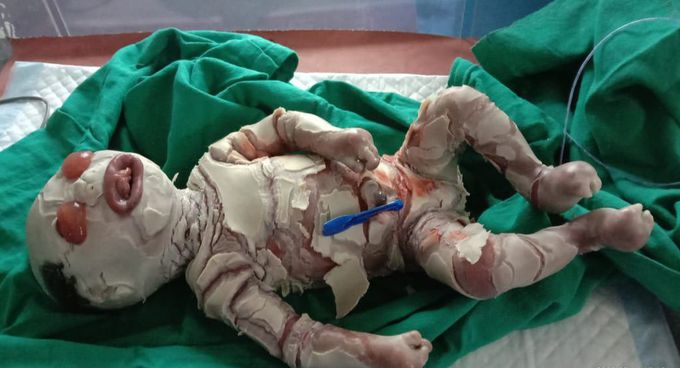


HARLEQUIN ICHTHYOSIS
Harlequin ichthyosis, sometimes called Harlequin baby syndrome or congenital ichthyosis, is a rare condition affecting the skin. It’s a type of ichthyosis, which refers to a group of disorders that cause persistently dry, scaly skin all over the body. The skin of a newborn with Harlequin ichthyosis is covered with thick, diamond-shaped plates that resemble fish scales. On the face, these plates can make it hard to breathe and eat. That’s why newborns with Harlequin ichthyosis need immediate intensive care. Harlequin ichthyosis is a serious condition, but medical advances have greatly improved the outlook for babies born with it. Read on to learn more about Harlequin ichthyosis, including treatment options and where to find support if you’re the parent of a child with this condition. What are the symptoms of Harlequin ichthyosis? The symptoms of Harlequin ichthyosis change with age and tend to be more severe in infants. In newborns Babies with Harlequin ichthyosis are usually born prematurely. That means they may have a higher risk of other complications as well. The sign people usually first notice is hard, thick scales all over the body, including the face. The skin is pulled tightly, causing the scales to crack and split open. This hardened skin can cause a number of serious issues, including: eyelids turning inside out eyes not closing lips pulled tight, leaving the mouth open and making nursing difficult ears fused to the head small, swollen hands and feet limited mobility in arms and legs nursing difficulties breathing problems due to tight chest skin infections in deep skin cracks dehydration low body temperature high sodium in the blood, known as hypernatremia In older children and adults Children with Harlequin ichthyosis may experience a delay in physical development. But their mental development is usually on track with other children their age. A child born with Harlequin ichthyosis will likely have red, scaly skin throughout their life. They may also have: sparse or thin hair as a result of scales on the scalp unusual facial features due to stretched skin reduced hearing from a buildup of scales in the ears problems with finger movement due to tight skin thick fingernails recurring skin infections overheating due to scales that interfere with sweating What causes Harlequin ichthyosis? Harlequin ichthyosis is a genetic condition that’s passed on through autosomal recessive genes. You can be a carrier without actually having the disease. For example, if you inherit the gene from one parent, you’ll be a carrier, but you won’t have Harlequin ichthyosis. But if you inherit the affected gene from both parents, you’ll develop the disease. When both parents are carriers, there’s a 25 percent chance that their child will have the condition. That figure holds true for each pregnancy with two parent carriers. According to the National Organization of Rare Disorders, Harlequin ichthyosis affects about 1 in every 500,000 people. How is it diagnosed? Harlequin ichthyosis is usually diagnosed at birth based on appearance. It can also be confirmed through genetic testing. How is Harlequin ichthyosis treated? With improved neonatal facilities, infants born today have a better chance of living longer, healthier lives. But early, intensive treatment is vital. Initial treatment A newborn with Harlequin ichthyosis requires neonatal intensive care, which may include spending time in a heated incubator with high humidity. Tube feeding can help prevent malnutrition and dehydration. Special lubrication and protection can help keep eyes healthy. Other initial treatments might include: applying retinoids to help shed hard, scaly skin applying topical antibiotics to prevent infection covering the skin in bandages to prevent infection placing a tube in the airway to help with breathing using lubricating eye drops or protective devices on the eyes

